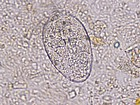Paramphistomum
Jump to navigation
Jump to search
| This article is still under construction. |
Paramphistomum spp are of the family Notocotylidae. Paramphistomomes are rare in the UK, but can cause severe losses in ruminants in the wet tropics
The adult fluke is plump and cylindrical (unusual for a trematode). It attaches to the wall of the rumen without causing serious damage. The eggs are like those of Fasciola, but are colourless, and have long filaments present at the poles.
The intermediate hosts are water snails, and these shed cercariae which later form metacercariae on vegetation.
Disease occurs if metacercariae are eaten in large numbers. Enteritis and diarrhoea result when immature flukes migrate along the small intestine, (where the metacercariae excyst) towards the rumen.
